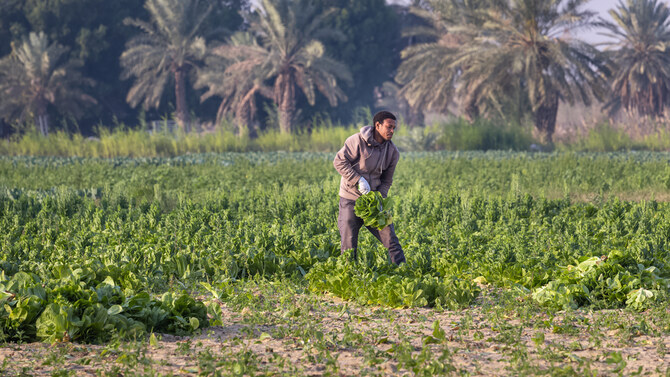
26 Oct 2024
JEDDAH: Saudi Arabia has unveiled an SR37 billion ($10 billion) investment gap in its agriculture sector, urging the private sector to seize this opportunity to enhance production and infrastructure.
Sulaiman Al-Khateeb, assistant deputy minister for agriculture affairs, highlighted the shortfall during the 41st Saudi Agricultural Exhibition in Riyadh, the Saudi Press Agency reported.
He emphasized the need for private investment in key areas such as plant production, animal husbandry, fisheries, and agricultural processing.
These efforts are critical to achieving the National Agriculture Strategy 2034 goals and advancing Saudi Arabia’s push toward food self-sufficiency and sustainability.
In alignment with Vision 2030, the Kingdom aims to expand its agricultural capabilities, ensuring food security and driving economic diversification as part of its broader sustainable development strategy.
Despite having approximately 90 percent of its territory as desert, Saudi Arabia is spearheading an agricultural boom to enhance domestic crop production and reduce reliance on food imports. The Kingdom has already achieved self-sufficiency in dates, fresh dairy products, and table eggs, according to the General Authority for Statistics’ Agricultural Statistics Publication.
Saudi Arabia’s food strategy focuses on sustainable natural resource use, innovation, leadership, pest prevention, boosting the agricultural sector’s contribution to the national economy, and building a vibrant agricultural community.
Al-Khateeb outlined prominent investment opportunities, such as SR4.1 billion in integrated facilities for producing and processing vegetables like potatoes, tomatoes, strawberries, onions, and leafy greens.
He also noted SR2.1 billion in potential investments for citrus and mango production and SR690 million for seed and seedling facilities.
Investment opportunities also extend to alternative feed production and livestock and fisheries, including intensive livestock breeding projects worth approximately SR8.9 billion. Additional investments of SR5.4 billion are available for poultry farming and by-product utilization, while aquaculture projects, including shrimp and algae farming, present opportunities worth SR7 billion.
Al-Khateeb also highlighted SR8.1 billion in potential investments in agricultural processing and manufacturing for importing raw materials and producing coffee, cocoa, and sugar products. Olive oil production offers an additional SR400 million in opportunities.
To support these efforts, the Ministry of Environment, Water, and Agriculture has established various incentives and enablers for the agricultural sector, aimed at increasing production efficiency and achieving self-sufficiency in key crops and products to bolster food security in the Kingdom.
Key initiatives include promoting investment in agriculture, adopting modern technologies through loans from the Agricultural Development Fund, and offering incentivized land leases.
The ministry is also streamlining project licensing and providing technical support to enhance farmers' skills and promote modern agricultural practices. MEWA encourages agricultural companies to list on financial markets as well.
Al-Khateeb highlighted several strategic initiatives to boost agricultural production and improve sector efficiency, including halting the cultivation of perennial fodder in favor of seasonal crops, shifting to intensive livestock breeding, and localizing strategic crop seed production.
The ministry is also establishing local wheat production targets to strengthen food security while focusing on increasing exports of fish and vegetables from advanced greenhouses.